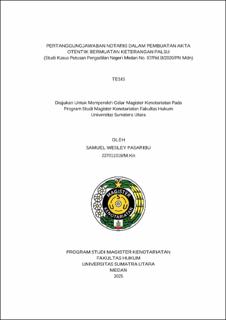| dc.description.abstract | Notaries have an important role in making authentic deeds that have perfect evidentiary power. However, in practice, there are still cases of making authentic deeds containing false information, such as in the Medan District Court Decision Number 97/Pid.B/2020/PN Mdn. This raises questions regarding the legal responsibility of notaries and the parties involved in making the deed. The formulation of the problem in this study is how is the concept of notary responsibility in making authentic deeds according to laws and regulations in Indonesia, the form of notary legal responsibility in making authentic deeds containing false information, and the application of legal responsibility to notaries in cases of making authentic deeds containing false information based on the Medan District Court Decision Number 97/Pid.B/2020/PN Mdn.
The method used in this writing is the normative legal research method, namely a method that refers to legal norms carried out by means of literature studies, this research is descriptive in nature, and the data is analyzed qualitatively.
Based on the research results, it can be concluded that the concept of notary accountability in making authentic deeds in Indonesia applies a multi-layered supervision system that includes administrative aspects based on the UUJN, civil aspects through the principle of professional liability in Article 1365 of the Civil Code, and criminal aspects based on forgery offenses in the Criminal Code. This is reflected in the Medan District Court Decision Number 97/Pid.B/2020/PN Mdn which sentenced only M. Amiruddin based on Article 266 paragraph (1) of the Criminal Code, while for Notary NI there was no evidence of any intent in assisting the criminal act and it is more appropriate to follow up through a supervision and guidance mechanism in accordance with the UUJN. This approach reflects the complexity of the role of a notary as a public official who requires a balance between authority in making authentic deeds and responsibility to ensure legal certainty for the community. | en_US |


